Unity, Justice, and Time in Martin Luther King’s Reality
By Chinelo Tyler, Connectional YPD President
The “Letter From a Birmingham Jail” is an excellent artifact. It offers a complete historical view into the Zeitgeist of the 1960s. Martin Luther King, Jr’s letter serves America’s collective historical memory as a poignant intellectual tour de force in the face of moral criticism and stinging conflict.
While directly involved in the Birmingham Campaign in the spring of 1963, King and the Southern Christian Leadership Conference (SCLC) led a campaign of nonviolent direct action against the city’s stiff racial structures. The heavy criticisms from the City’s white moderate power structure would eventually come together in the culmination of a written appeal entitled, “A Call for Unity.” The appeal, specifically penned by Birmingham’s white moderate religious leaders, begged King to reconsider his actions, as he was an outside agitator bringing unneeded friction to a city brimming with racial tensions.
The appeal admonished King and the campaign as being untimely and counterproductive to the proper systems of legality. These religious leaders were not bigots but men of their respective era, seeking a sense of stability in a society appearing on the brink of an evident collapse. Seizing his chance, King craftily uses their letter as an opportunity to respond to the criticisms of the Civil Rights Movement.
Written in a dark jail cell on the margins of scrap newspaper, the Letter masterfully explains the importance of unity, justice, and time in the fight for equality. Naturally, King’s letter begins by explaining why he is present, “We are caught in an inescapable network of mutuality, tied in a single garment of destiny.”
The Atlanta based SCLC, although unwelcomed, was a relatively local organization with highly intrinsic American values such as equality and justice. The white moderate clergymen of Birmingham had no problem with stating their dissatisfaction with the organization saying, “we believe this kind of facing of issues can best be accomplished by citizens of our own metropolitan area.”
Also, the importance of unity is central to the letter. Facing the backlash of the anti-integrationists and the disapproval of white moderates, King eloquently ties together the common mutuality of mankind, “We are caught in an inescapable network of mutuality, tied in a single garment of destiny. Whatever affects one directly, affects all indirectly. Never again can we afford to live with the narrow, provincial ‘outside agitator’ idea.”
With these values, their acts of civil disobedience were still met with stringent resistance. His letter directly discourages the idea of the outside agitator, which presents the reader a look into the gaping divides which consumed 1960s America. These divides caused constant strife, dissolving the unity of a nation on issues such as integration, federal power, and problems which plagued the Negro.
Justice, another prominent theme, is also addressed in the primary source. King explains the immorality present in de facto segregation, “The answer lies in the fact that there are two types of laws: just and unjust.” King calls attention to man’s improper use of just laws.
Birmingham’s rigid systems of de jure andde facto segregation were totally legal and viewed as culturally acceptable. King vividly explained the dynamic of groups in the letter, “Lamentably, it is an historical fact that privileged groups seldom give up their privileges voluntarily. Individuals may see the moral light and voluntarily give up their unjust posture; but, as Reinhold Niebuhr has reminded us, groups tend to be more immoral than individuals.”
Time is another common construct in King’s literature and offers some background for many of the issues highlighted in the Letter, particularly the quest for integration and civil rights. King says, “There comes a time when the cup of endurance runs over, and men are no longer willing to be plunged into the abyss of despair.”
Impatiently, he continues, “One of the basic points in your statement is that the action that I and my associates have taken in Birmingham is untimely.” King passionately disagrees and labels time as being relative to the individual. He believes the construct of time could be used for either nefarious purposes or the realization of the positive.
Unity, justice, and time are all found tightly interwoven in King’s intellectual work. All are essential to the Civil Rights Movement of the 1960s, with each defending a common ideal fought for by tireless African Americans.
Time defends the execution and appropriateness of their campaigns. Justice explains their actions in the face of obstinate political leaders, immoral laws, and fearful moderates. Unity calls for a consolidated front to battle racism. Combined and applied, the 1960s would see a sweeping clash in the midst of Johnson’s “Great Society.”





